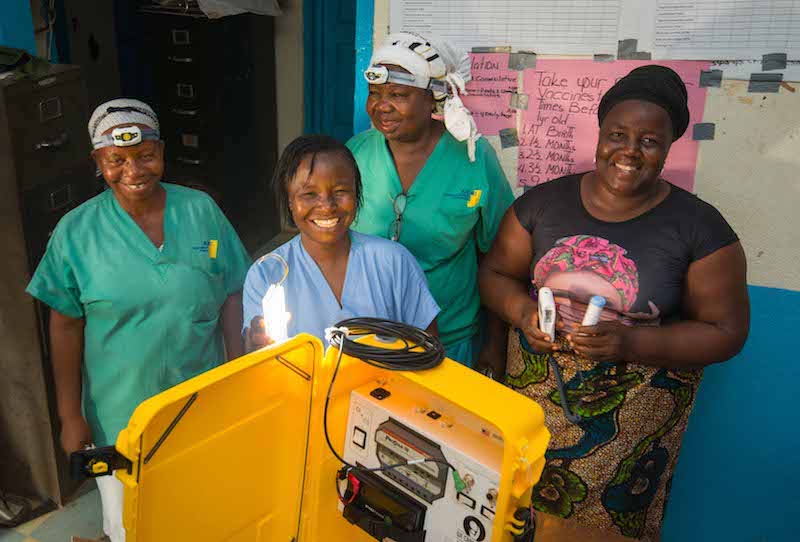
In 2016 We Care Solar partnered with the Liberian Ministry of Health and non-governmental organisations to spearhead a country-wide initiative called Light Every Birth.
The aim of the Light Every Birth initiative is to improve the functioning of energy-poor facilities providing obstetric care, to demonstrate the impact of sustainable energy on maternal and newborn health; and to advocate the fundamental rights for all mothers to deliver with sufficient lighting.
Suitcase installations targets government health facilities through collaborating with the Liberian government, NGOs and UN Agencies to enact this commitment. The goal is to highlight Liberia as a “Model of Excellence” for electrification of maternity care – with a long-term vision of elevating the Light Every Birth Initiative to a continental and global scale.
|
Implementer |
GIZ/Energising Development (EnDev), Africare, Public Health Initiative Liberia (PHIL), UNICEF, UNFPA, UN Women, Family Health Division (FHD)/Ministry of Health (MoH), Innovation for Poverty Action (IPA) |
|
Donors and budget |
UBS Optimus Foundation, Gilead Foundation, UNDESA, Music for Relief, Sillicon Valley Fund and private donors |
|
Start and end date |
March 2017 - 2020 |
|
Aims/objectives |
|
|
Geographic coverage |
All 15 counties of Liberia |
|
Target groups |
Expectant and new mothers, newborns, health workers |
Components
Component 1: Health facility Assesment and Selection to guarantee light provision for most needed facilities
During the facility assesment and selection process We Care Solar works with the county health teams, FHD, and EnDev to identify all health facilities in the country with no or unreliable electicity. Determining which of these are appropriate for solar suitcases. The criteria selection includes:
- Maternal and child health – Facility should offer obstetric care, have skilled personnel that are qualified to conduct deliveries, and be open 24 hours to offer maternal health services
2.Electricity – Facility should have no source of electricity or unreliable electricity (outages more than 2 hours a day)
3.Sustainability – Facility size, structure, and access to sunlight all affect its suitability for a Solar Suitcase
Component 2: Capacity Building to guarantee proper use and sustainability of installed systems through routine maintenance
These Capacity Building activities are made to ensure the proper use of the suitcase. During the installations the staff are trained to guarantee a smooth operation of installed systems. Within the solar suitcase there is a user manual that explains in detail how to and how not to use the system. Also included is a minimum maintenance explanation for the health workers. After the installation is completed, We Care Solar will ensure that the Solar Suitcases are maintained over time through capacity building of the MOH at the county and national levels and develop a strategy to facilitate the handover of the Solar Suitcases to the MOH at the conclusion of the program.
Component 3: Study Evaluation to understand the impact of reliable solar electricity for maternal care throughout Liberia
The study conducted by IPA involves quantitative and qualitative data collection and analysis focusing on maternal and newborn health care services. The study consists of a Baseline, key informant interviews and Endline. The study outcome will hopefully improve the overall maternal health situation in Liberia.
Activities, Updates, Results
October 2018
To date, Solar Suitcases have been installed in 320 health facilities in Liberia. More than 1,500 health workers across 14 counties have been trained in Solar Suitcase usage. Installations by EnDev are ongoing, with plans to install an additional 129 Solar Suitcases by March 2019
February 2018
Innovations for Poverty Action is conducting an evaluation of the impact of the Solar Suitcases on provision of quality maternal healthcare. They completed a baseline analysis in early 2018 using data collected by installation partners. Endline data collection is planned for late 2018 and the final report will be available in Q2 2019.
June 2017
Representatives from We Care Solar, UBS Optimus Foundation, GIZ/EnDev, PHIL and Africare met to discuss progress, challenges and next steps of the project.
More articles about We Care Solar: